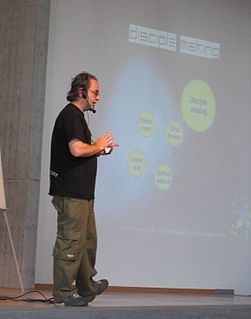Top 62 Quotes & Sayings by Alan Hirsch
Explore popular quotes and sayings by an Australian author Alan Hirsch.
Last updated on April 15, 2025.
In short, apostolic movement involves a radical community of disciples, centered on the lordship of Jesus, empowered by the Spirit, built squarely on a fivefold ministry, organized around mission where everyone (not just professionals) is considered an empowered agent, and tends to be decentralized in organizational structure.
When the church is in mission, it is the true church. The church itself is not only a product of that mission but is obligated and destined to extend it by whatever means possible. The mission of God flows directly through every believer and every community of faith that adheres to Jesus. To obstruct this is to block God's purposes in and through his people.
Being the church that Jesus intended means that we must participate in God’s eternal purposes for his world. Renewal means more than reinventing ourselves; it means rediscovering the primal power of the Spirit and the gospel already present in the life of the church—reconnecting with this purpose and recovering the forgotten ways. This purpose and potential have always been there, but individuals and communities have largely lost touch with them.
Whether [new Protestant church movements] place their emphasis on new worship styles, expressions of the Holy Spirit’s power, evangelism to seekers, or Bible teaching, these so-called new movements still operate out of the fallacious assumption that the church belongs firmly in the town square, that is, at the heart of Western culture. And if they begin with this mistaken belief about their position in Western society, all their church planting, all their reproduction will simply mirror this misapprehension.



















